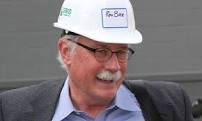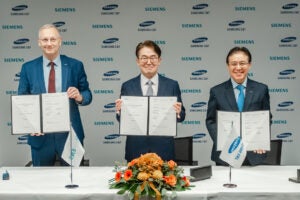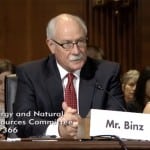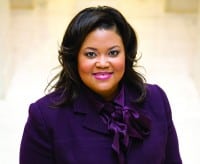By Kennedy Maize
Washington, D.C., Sept. 20, 2013 – Within minutes of the White House announcement that Ron Binz was its choice to become chairman of Federal Energy Regulatory Commission in June, I got an email from a D.C. public relations firm, VennSquared, lauding Binz and larded with pre-cooked quotes from industry executives and others supporting the nomination.
I was stunned. I’ve covered almost every FERC appointment going back to the first, Charlie Curtis, in 1977. Never had I come across what appeared to be a coordinated campaign to promote a nominee. So I contacted a couple of sources, who have been around even longer than I (and that’s saying something), one a Democrat who lobbied for a variety of energy industry groups, the other a Republican who had staffed a key House committee and held key jobs in the Department of Energy.
I asked my contacts if they had ever seen such an orchestrated effort – bearing the marks of a political campaign – on behalf of a FERC nominee. They were as baffled as I about the campaign for Binz and both suggested to me that it could come back to bite him and his nomination.
Indeed, it now looks like the Binz nomination will fail to win Senate confirmation, and a lot of the blame must go to the organized program to promote his candidacy. Based on emails released to the Washington Times newspaper, it appears that the pro-Binz campaign was organized by groups allied to the Democratic Party and financed by the deep-pockets of the very-green Energy Foundation in California. The foundation has been a client of Binz’s consulting practice.
The Binz supporters – and I have no views on whether he should or should not serve on FERC – understood that his nomination would be controversial, given that his actions as chairman of the Colorado Public Utilities Commission angered local coal interests, as well as the state’s important rural electric cooperatives. So the Binz allies made a decision to try to preempt the criticism; instead, they highlighted it.
The visible and public campaign for Binz gave Sen. Lisa Murkowski (R-Alaska) an easy way to oppose the nomination. She’s a centrist Republican and ranking member of a committee, the Senate Energy and Natural Resources Committee, which has never been noted for partisanship. Anti-Binz forces, which arose after the pro-Binz campaign launched, were hammering the Colorado regulator for his views on coal and natural gas. Those attacks, frankly, had little substance and probably would not have persuaded Murkowski to oppose the nomination.
But the attempt to campaign for Binz and muster political support for his case clearly irritated Murkowski. The issue of the orchestrated campaign dominated her questions of Binz during the Sept. 18 confirmation hearing. She wondered whether such tactics would become “the new normal” for nominations. When Murkowski announced at the end of hearing that she could not support his nomination, Binz was effectively a dead nominee walking.
Later in the day, Sen. Joe Manchin (D-W.Va.), the leading coal state Democrat, told reporters he would vote against the Binz nomination. That pretty much closed the coffin on the nomination. The numbers are easy to parse. The Democrats have 12 votes on the committee. The GOP has 10. If all the Republicans are opposed, and one Democrat joins then, the result is a tie.
The Senate leadership is not bound by committee votes on White House nominations, and can take the confirmation to the floor despite a committee recommendation. But with a tie or negative vote from the committee with jurisdiction, that’s a losing tactic. So it’s unlikely that a Binz nomination will go to the Senate floor, and even less likely that it would be approved.
The failure of the Binz nomination suggests that whoever thought it was a good idea to mount a political campaign to get him confirmed should be kept away from any future FERC nominations.









